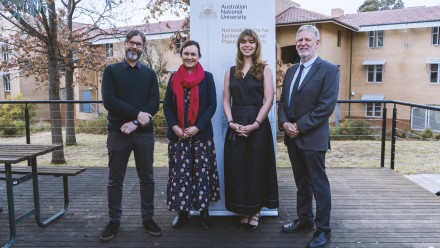National Centre for Aboriginal and Torres Strait Islander Wellbeing Research Seminar Series
Share
Seminar Recording 6 April 2022
About
To successfully plan and implement health programs, Indigenous peoples require relevant, useful and comprehensive population health information to inform and evaluate policies and services.
Ensuring that Indigenous peoples lead the planning, governance, implementation and management of their health information is critical for the advancement of Indigenous rights and health systems effectiveness, as highlighted through the COVID-19 pandemic and beyond.
Investments to advance Indigenous specific human resource development in population health sciences, including applied epidemiology, health information systems and health service evaluation have been limited. This contributes to a vast under-representation of Indigenous peoples and there are striking gaps in information infrastructure in relation to respectful, self-determined and sovereign mechanisms to accurately and systematically capture data for the needs of Indigenous peoples. This results in a discounting of hundreds of thousands of Indigenous peoples and a masking of racialized health inequities.
The panel will discuss:
Prof Ray Lovett: Indigenous Data Sovereignty in the context of Epidemiology?
Indigenous Data Sovereignty (IDSov) has emerged from indigenous communities across the globe in response to extractive and deficit based research and data practices. Epidemiology has a long history of extractive and deficit based research and this has led to a problematic focus on Indigeneity as the cause of health inequality. Ray will highlight how Epidemiology can do better through embedding IDSov principles in epidemiological research.
Bobby Maher:
Evaluation practice in Australia is being asked to (re) center Indigenous epistemologies, ontologies and axiology (ways of knowing, doing and being) in response to a lack of specific and methodologically appropriate evaluations of Indigenous programs, policies and services. Bobby will discuss an assets-based approach that draws on the notion of collective capability as one way to build Indigenist evaluation practice within Australia.
Dr Sarah Bourke:
Indigenous ways of knowing, being, and doing can be incorporated into all stages of epidemiological research. Working in an interdisciplinary way can help to embed these Indigenous knowledges into the research development process and produce better outcomes for the researchers, participants, and other stakeholders. Sarah will provide her analysis of how Indigeneity (the experience of being an Indigenous person) can be a valuable research tool in the field of epidemiology, based on her work with the Mayi Kuwayu Study.
Prof Janet Smylie: Beyond ‘Colonizing data systems’
Indigenous peoples been doing “epidemiology” for millennia: Systematically tracking wellbeing outcomes at a population level for humans, animals, and ecosystems (all our relations), analyzing patterns, arriving at conclusions, and translating into collective actions. Janet will start by identifying shared characteristics of “colonizing data systems” and then present a brief overview of Indigenous led, Indigenous governed approaches to health information systems for and by Indigenous peoples in urban and related homelands in Canada. She will finish with an overview of an applied Indigenous epi training program that is in development in Canada.








